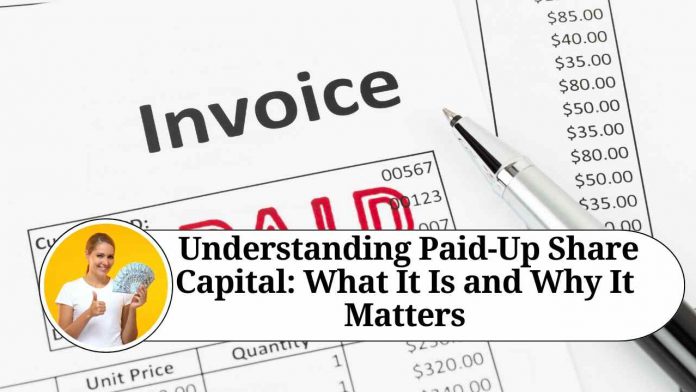INTRODUCTION
When a company issues shares, it does so to raise capital for various purposes such as funding new projects, expanding operations, paying off debts, or simply to meet its working capital requirements. The money collected from the sale of these shares is known as the share capital of the company.
However, not all of the share capital is immediately available to the company. The amount that has been collected from the shareholders and is available for immediate use by the company is called the paid-up share capital. The rest of the share capital is called the uncalled share capital, which the company can call upon at a later stage if needed.
Paid-up share capital plays an important role in determining the financial health and stability of a company. It is a key measure of a company’s ability to meet its financial obligations and to invest in new projects. A higher paid-up share capital indicates that the company has a stronger financial position and is better equipped to weather any financial uncertainties that may arise.
Paid-up share capital is also important in determining the ownership structure of a company. Shareholders who have purchased shares and paid for them are entitled to a proportionate share of the company’s profits and assets. The amount of paid-up share capital held by each shareholder determines their stake in the company and their voting rights.
Paid-up share capital can be increased by issuing new shares and collecting money from shareholders. Conversely, it can also be reduced if the company decides to buy back its own shares or if shareholders choose to surrender their shares.
Companies can increase their paid-up share capital by issuing new shares and collecting money from shareholders. This process is known as a capital raise, and it can be done through a public offering or a private placement. In a public offering, the company issues new shares to the general public through a stock exchange or other public market. In contrast, a private placement involves the sale of new shares to a select group of investors, usually institutional investors or high net worth individuals.
Investors and analysts often use paid-up share capital as an indicator of a company’s performance and growth potential. A company with a higher paid-up share capital generally has more resources at its disposal to invest in new projects, expand its operations, and weather any financial uncertainties that may arise. As such, investors may view companies with a higher paid-up share capital as more attractive investment opportunities.
On the other hand, companies with lower paid-up share capital may be viewed as riskier investments, as they may have fewer resources to invest in new projects or to handle unexpected financial difficulties. However, it is important to note that paid-up share capital is just one of many metrics that investors and analysts use to evaluate companies, and it should not be the sole basis for investment decisions.
CONCLUSION
paid-up share capital is a crucial metric that helps investors and analysts evaluate a company’s financial health and stability. A higher paid-up share capital generally indicates that a company has more resources to invest in new projects and handle financial uncertainties. Companies can increase their paid-up share capital by issuing new shares and collecting money from shareholders, while investors can use paid-up share capital as one of many metrics to evaluate investment opportunities.
Other Related Blogs: Section 144B Income Tax Act
Frequently Asked Questions (FAQs)
Q.What is paid-up share capital?
Paid-up share capital is the amount of money that a company has collected from its shareholders for the shares they have purchased.
Q.Why is paid-up share capital important?
Paid-up share capital is important because it is a key measure of a company’s financial health and stability. A higher paid-up share capital indicates that the company has more resources at its disposal to invest in new projects and handle financial uncertainties.
Q.How is paid-up share capital calculated?
Paid-up share capital is calculated by subtracting the uncalled share capital from the total share capital. The uncalled share capital is the amount of money that has not yet been collected from shareholders for the shares they have purchased.
How can a company increase its paid-up share capital?
A company can increase its paid-up share capital by issuing new shares and collecting money from shareholders through a public offering or a private placement.
How can a company reduce its paid-up share capital?
A company can reduce its paid-up share capital by buying back its own shares or if shareholders choose to surrender their shares.
What is the difference between paid-up share capital and authorized share capital?
Authorized share capital refers to the maximum number of shares that a company is authorized to issue, while paid-up share capital refers to the amount of money that has been collected from shareholders for the shares they have purchased.
How does paid-up share capital affect shareholder rights?
The amount of paid-up share capital held by each shareholder determines their stake in the company and their voting rights. Shareholders who have purchased shares and paid for them are entitled to a proportionate share of the company’s profits and assets.
Can paid-up share capital be negative?
No, paid-up share capital cannot be negative. If a company has negative shareholder equity, it means that its liabilities exceed its assets.
Is paid-up share capital the same as share premium?
No, paid-up share capital is not the same as share premium. Share premium is the excess amount that a company receives from shareholders over the face value of its shares. Paid-up share capital, on the other hand, is the amount that has been collected from shareholders for the shares they have purchased.
Can paid-up share capital be used for any purpose?
Yes, paid-up share capital can be used for any purpose that is authorized by the company’s articles of association. However, companies are required to comply with various legal and regulatory requirements when using their share capital.




















